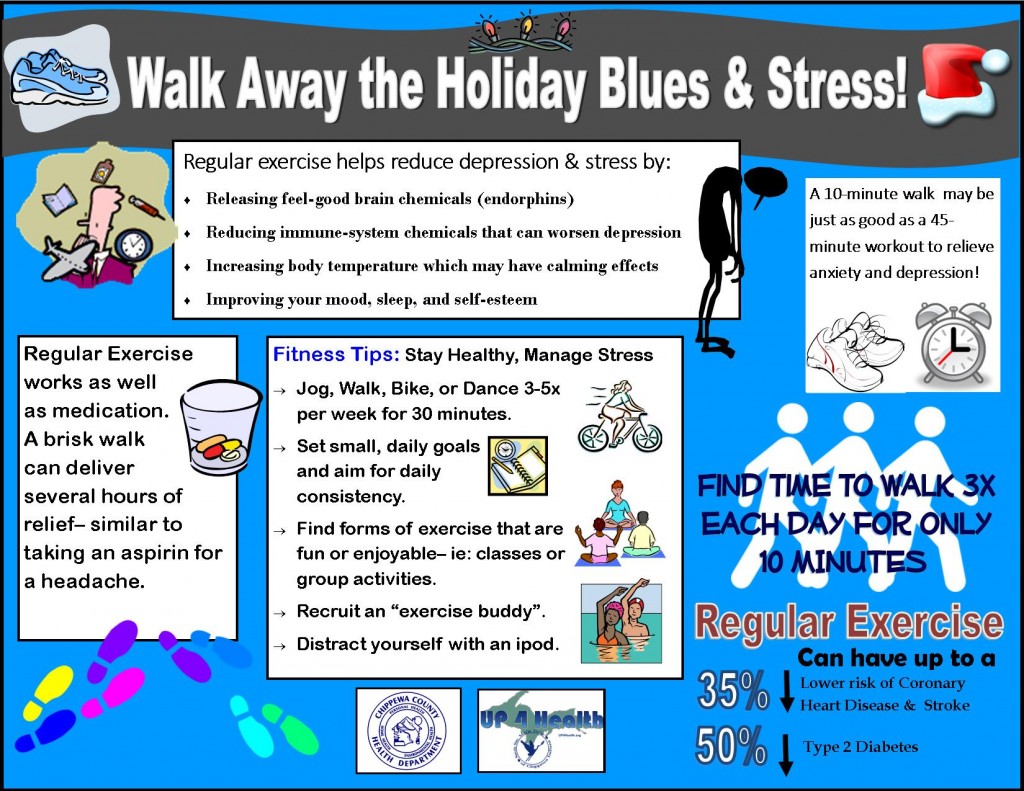 Tis the season to be jolly…fa-la-la-la-la. Right, it may be a season to be jolly for some of us but there are a few out there who experience the holiday blues for so many reasons. I can see it in the emails I receive. I am not a therapist but for some reason, more and more visitors email me asking for advice for all sorts of reason. Of course, their questions are for my eyes only. They are sad, lonely and depressed. The suicide rate is even the highest during this holiday season. How I wish I could help but I am not a professional counselor though I can offer friendly advice. I’ve gathered a few tips for those feeling the holiday blues. As you might know, the holiday blues is defined as a feeling of sadness, loneliness, depression and even anxiety that often occur in and around the holiday season.” You or your loved one might be having a temporary spell of the blues without knowing it. There is nothing abnormal about having the “holiday blues,” which are more like a mood than any sort of lasting condition. Depression, anxiety, and other psychological symptoms are associated with the holidays because this season brings back memories of a happier time in our lives.
Tis the season to be jolly…fa-la-la-la-la. Right, it may be a season to be jolly for some of us but there are a few out there who experience the holiday blues for so many reasons. I can see it in the emails I receive. I am not a therapist but for some reason, more and more visitors email me asking for advice for all sorts of reason. Of course, their questions are for my eyes only. They are sad, lonely and depressed. The suicide rate is even the highest during this holiday season. How I wish I could help but I am not a professional counselor though I can offer friendly advice. I’ve gathered a few tips for those feeling the holiday blues. As you might know, the holiday blues is defined as a feeling of sadness, loneliness, depression and even anxiety that often occur in and around the holiday season.” You or your loved one might be having a temporary spell of the blues without knowing it. There is nothing abnormal about having the “holiday blues,” which are more like a mood than any sort of lasting condition. Depression, anxiety, and other psychological symptoms are associated with the holidays because this season brings back memories of a happier time in our lives.
Who experiences the Blues?
People who might be at risk for feeling blue at the holidays include:
- Someone who has a death in the family
- Someone who has experienced financial setbacks at the holidays
- Someone who is separated from loved ones at the holidays with work, military obligations or other reasons
- Someone who has experienced other losses – moving, recent difficult medical diagnosis
- Someone who has experienced a change in lifestyle – getting married, getting divorced, new baby
- Someone who tends to be depressed, stressed, anxious
 How will you recognize you have the blues?
How will you recognize you have the blues?
- Headaches
- An inability to sleep or sleeping too much
- Changes in appetite that cause either weight loss or gain
- Agitation and anxiety
- Excessive or inappropriate feelings of guilt
- Diminished ability to think clearly or concentrate
- Decreased interest in activities that usually are enjoyable, such as: food, sex, work, friends, hobbies and entertainment.
 How does one cope with the Holiday Blues?
How does one cope with the Holiday Blues?
For anyone feeling blue during the holidays can follow some very basic, common sense steps to help in coping with the blues.
- Take things one day at a time and if need be one hour at a time.
- Try and maintain a normal routine. Keep doing your normal daily activities.
- Get enough sleep or at least enough rest.
- Regular exercise, even walking, helps relieve stress, tension and improve moods.
- Eat a healthy, balanced diet. Limit high calorie foods and junk food.
- Avoid using alcohol, medications or other drugs to mask the pain.
- Do those activities or things and be with the people that comfort, sustain, nourish and recharge you.
- Remember the healthy coping strategies you have used in the past to survive challenges. Draw on these strengths again.
What does one do to feel less blue during the Holidays?
There are several things that can help in making it easier to manage the blues.
- Determine your priorities and establish realistic goals for the holidays.
- Delegate some responsibilities to others.
- Take time for yourself.
- Minimize financial stressors by setting a budget and sticking to it.
- Enjoy free holiday activities.
- Think about giving a free gift from your heart. Your time or your presence.
- Be around supportive people.
- Volunteer and help someone else.
- Create a New Holiday Tradition.
- Find a new place or a new way to celebrate.
Source: Holiday Blues – Feeling Sad, Lonely or Depressed During the Holidays?
For those facing Christmas alone for the first time due to death of a loved one, I encourage you to reach out to someone you trust and share your feelings with them. Devote a place and time before Christmas Day in which you can openly honor your loved one and acknowledge your feelings. On Christmas Day, intentionally set your focus on family and friends who not only share in your loss, but who bring precious gifts of love and support to aid in your healing journey.
Be aware that the hurts of a loss, a broken relationship, or simply of being alone are magnified during the holiday. Look for those around you who are hurting and care for them, spend time with them, love them.
For those that lost a child, here are two posts I wrote ,on Coping and Surviving Christmas and Handling the Holidays.
Just know that while the Holiday Blues can be emotional, intense and upsetting, these feelings tend to be temporary and last at the most for about 2 weeks. The Blues end and people generally feel better once the holiday season is over and get back into their normal daily routine.
For many years after my son died, Christmas was a dreaded holiday by my husband. In turn, I dreaded his sour mood. Today, I look forward to the holiday season more than ever. I smile and sigh that finally my husband is able to handle the holidays a little bit better. I gather in my blessings and count them all. I count the blessings of the most important people in my life and I find the peace that comes with counting a holiday of joy remembered and love shared. Love never dies, and the light always shines in our hearts and home.
Image via blog.carvana.com


oh you’re so right. even some christmas songs are very melancholic.
noemi,
my daughter just recently went through the holiday blues or school blues. she was crying for weeks and there was not much i could do but to comfort her over the phone 3 times a day. i turned to a friend of mine for help and she gave me a small piece of paper loaded with useful and nifty reminders:
STOP!
* accept the feeling – it cannot hurt you
* give yourself permission to feel anxious
* breathe slowly through your nose
* calm yourself with positive self-talk
* let go, float, and flow.
* distract yourself, it is only anxiety.
* use the adrenalin in a positive pursuit.
* don’t let a bad day scare you.
* give yourself credit for how far you’ve come.
* let time pass. IT WILL GO AWAY.
she is feeling better now and having a good time in Hawaii with a Capella group. i also told her to walk or exercise everyday to release serotonin in the brain.
@belle- at least you talked to her over the phone. Those tips are really sound and helpful, It acknowledges the feelings are not wrong but that there is a way out of it if one wants to. She’ll feel better once she’s home with you.
I know someone who refuses to have any christmas decor at their home. And that’s only because they lost a child a year ago. What I know is the surviving children look forward to christmas traditions they were used to. It’s sad if one affects the rest.
@joanne- i guess that’s how they deal with the blues. One can even start a new tradition to ease the sadness.
I am experiencing the blues. Thank you so much for the tips. I’m glad to know that I am not alone in this feeling.
My sister is so broken hearted because her boyfriend just broke off with her. Right now she sleeps all the time whch makes me wonder if she is depressed. I’ll go talk to her now.
i have holiday blues for a few reasons:
– death of my grampa
– death of a friend
– away from my family (i miss my son)
– just got a car, i’m getting anxiety from driving
– shorter days, longer nights (5pm = dark)
– christmas ate my budget
my treatment for the blues…. my wonderful guinea pigs 🙂 love my pets
ive also been in an emotional roller coaster this year. its really tough. and until now i still loathe hearing that “pasko na sinta ko” song.
@issai- am glad you have a pet. They really comfort us .
@eric- ack there are just so many pasko sinta ko versions. It’s sickening.
Pingback: Kutitots » Blog Archive » Yet another sad Christmas
Pingback: Kutitots » Blog Archive » Yet another sad Christmas
Nice Blog. I have been looking for blogs and such that I can relate to. I invite you to come to my blog and join me in my delightful spiral into death depression and nothing.
Thanks for your time. Remain happy ?
At this point, I am semi anxious only, not depressed or sad. Meaning, there are moments I am gripped with sudden fear and crashing emotions. Of course I know why, the how just got clear to me so I am on the mend. Its a matter of attachement. Let go, and the fear is gone. Its a process and a journey. I am blessed by this gift, of renewing my understanding of myself and the opportunity to transform and transcend. You have a very helpful post Noemi.
I’ve been there… lonely on Christmas and New Year’s Eve. I guess we have society to blame for heightening one’s sadness during the holidays. Various forms of media dictate that one has to be happy during Christmas, that you become somewhat of an outcast if you’re blue during the holidays.
It’s just a day like any other- Christmas.